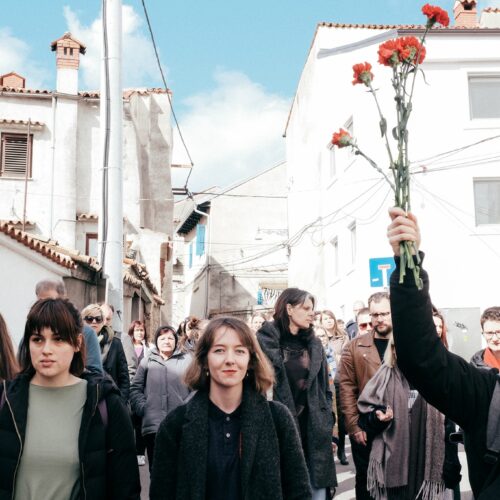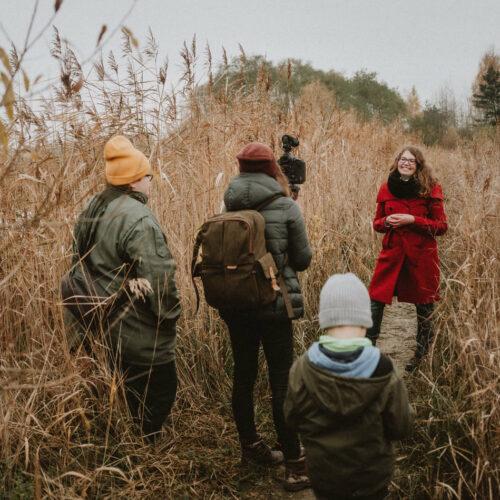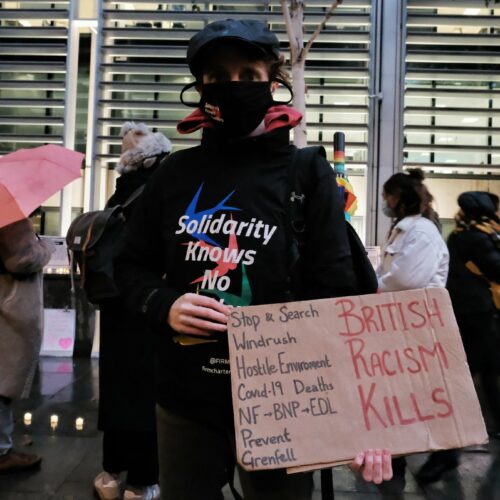The long-term goal of the Institute for Social Struggles is to historicise the past couple of decades of social struggles and create and share know-how with all the present and future activists. They want to make it easier for individuals and organisations to start their endeavours and help them not start from scratch as they had to on several occasions. Short-cuts to radical political change mean quicker learning from those who came before.

They want to commonise and share the accumulated political know-how and reach and engage as many people as possible. As a popular and easily accessible medium, they landed on a podcast as an apt vehicle for this knowledge sharing.
Their first vlog is be called “When We Come to Power”. It’s framed as a TV show where two girlfriends sit in a living room and talk on various topics over a cup of coffee.
In a couple of medium to long-form episodes per month, they plan on covering important political, especially left-wing feminist topics, in a humorous and laid-back manner. The short-term goal of this show is to reach a wider audience and make progressive, left-wing perspectives more accessible. They are primarily oriented towards female audiences, and they also want to show that women can do politics and activism – important, since their operating in a pretty hetero-macho-testo-environment. Their goal is to reach and engage a steady base of viewers outside of they ecosystem, that can be expanded on in the future.
Located at the margins of capitalism, Serbia is a country of deep social and other inequalities and cheap labour force, corruption and nepotism, a country from which both younger and older people emigrate in search of a dignified life. The poor socio-economic image of the country has its roots in 30 years of systemic oppression. After the 1990s and war conflicts, the country was hit by a wave of suspicious privatisations, selling out of key public resources, and gradual decline in worker’s rights, sealed with the Law on Workers’ Rights ratified in 2014 that works in the interest of those that hold the capital. The negotiations of Serbia to join the EU haven’t brought too many significant positive changes in the lives of common people. The political space keeps on shrinking, and it has been particularly prominent in the last 8 years, since the ruling Serbian Progressive Party came into power. Their rule, marked by undermining the work of public institutions, supporting and collaborating with right-wing organisations to enhance the divisive nationalist narratives. This regime’s rule is backed by the EU, as well as China and Russia.
Last year was marked by the COVID-19 pandemic and the poor response by the ruined public health care system which led to a series of violent protests. Although the protests didn’t have well-articulated demands, they accurately reflected the latent social unrest that had been present for years. The police were arresting peaceful protesters and beating passers-by.
The described political circumstances require a response from the left since the actual and the past regimes led mostly to the impoverishment of the majority of people and deterioration of human rights in Serbia with no indication of changing the direction whatsoever. In order to gain more support, the left needs more visibility, which is challenging with the mainstream media being heavily biased and controlled by the government. Speaking of mainstream media, check out this Al Jazeera vid on the 5 Filters of the Mass Media Machine:
Moreover, the ruling governments in the past 20 and more years based their narratives on demonising communism and SFRY experiences. The left has been facing these difficulties for a long time now, but people have started recognising the true characteristics of the neoliberal politics despite the empty promises it had in 2000. The left can help to better articulate the faults of the current politics as well as provide solutions that more people would be in favour of, a more honest kind of politics that reflects real grassroots needs from a justice lens.
This is why they are producing this podcast that tackles existing issues in Serbian society and creates a platform and trigger for discussing them, together with emphasising alternatives. They opted for this format as they noticed that this is how more younger people can be reached as they think it is important that the left attracts younger generations. The podcast is a convenient form for deepening arguments and showcasing them in a relatable way. Unlike books, podcasts can be consumed on the go and appear less demanding and serious.
Hopefully, that way they will enable younger people to think more in depth about issues around them and even care to join new solidarity efforts. All of the team members work with different initiatives and groups that fight for a more just society (housing, ecology, workers’ rights) that are in constant need of more members, advocates and supporters so this is just a launching pad for wider collective organising, from the studio room and into the streets and back into the halls of politics. Happy listening Serbocroatian speakers 😉



